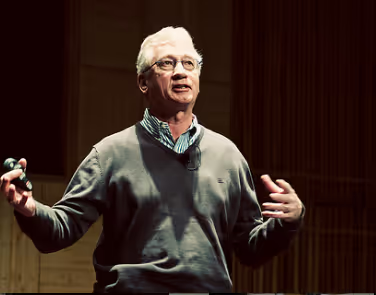Having heard the protests by prominent atheists against the excerpt published by salon.com (under the inflammatory banner "Has militant atheism become a religion?"), let me say that the role of religion and atheism covers only about 10% of my book. It is an important part, hence the book title, but needs to be weighed against the rest of my message. In order to discuss the biological origins of morality, which is its central theme, I need to get two groups out of the way. One is fundamentalist religion, for which morality comes from God. The other are the neo-atheists who, by labeling themselves rational and everyone else irrational, have closed the door to open and tolerant debate. Calling believers idiots can't possibly be a good discussion opener. This explains my stance against militant atheism (a label that is not mine, but Dawkins' by the way).
My book is about how morality doesn't come from above but rather is an evolutionary product. I speak of bottom-up morality, in line with the ideas of some psychologists (Haidt), philosophers and neuroscientists (Kitcher, Churchland). The book is rooted in my research on monkeys, apes, elephants, and other animals, and my conviction that they show the beginnings of morality. I have written about this before, but now I am bringing religion into the mix. Even though I don't think religion is absolutely critical, it is also not irrelevant. The question how humans would fare without it is hard to answer for the simple reason that religion is universal. There are no societies that are not now and never were religious.
Morality promotes cooperation. It asks us to put our personal interests on the back-burner and work for the common good. It is a complex system that religion and philosophy have tried to capture in simple rules (such as the golden rule or the ten commandments), but these rules provide only imperfect summaries. We like to think of morality as top-down, but this is merely a left-over of the story of God on the mountain top. There is no evidence that it started out as a top-down system. Science is rather coming around to the Humean view of morality guided by intuitions and passions. Looking at other primates, we recognize many of the same tendencies that underlie our morality, such as rules of reciprocity, empathy and sympathy, a sense of fairness, and the need to get along. Monkeys, for example, object to unfair distributions of resources (see the end of my TED talk), and chimpanzees do each other favors even if there is nothing in it for themselves. Bonobos are probably the most empathic animals of all, and the recent genome data places them extremely close to us.
Human morality goes beyond all of this, but ancient primate tendencies do play a crucial role. We have been indoctrinated that nature is "red in tooth and claw," and entirely selfish, but we are now learning about conflict resolution, cooperation, empathy, and the like, in our fellow primates. They are far more harmony-oriented than people realize. I don't necessarily call apes "moral beings," but we share with them an old psychology without which we'd never have become moral.
Atheism will need to be combined with something else, something more constructive than its opposition to religion, to be relevant to our lives. The only possibility is to embrace morality as natural to our species. Otherwise atheism will end up in the Big Black Hole that Thomas Henry Huxley created for himself in the 19th Century. He did not believe morality came from God, but also denied its possible evolution. He could not explain where it came from except for saying that we had to fight very hard against our own nature to become moral (which is of course an ancient Christian position related to original sin, and so on). In this, Huxley went against Darwin himself, who did see room for moral evolution, as explained in "The Descent of Man." To debate these important issues we all need to step back, stop shouting, and move beyond unanswerable questions about the existence of God. Atheists should be interested in this debate and I hope they will join in.



